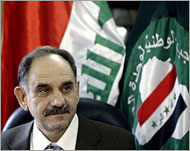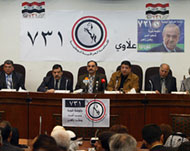Iraqi groups unite over poll concerns
Sunni Arab and secular political groups have joined forces to decide whether to reject the results of last week’s parliamentary election and call for a revote.

The agreement was reached at a meeting held in the offices of a secular bloc headed by Iyad Allawi, the former prime minister, on Wednesday.
“We decided to form an operations room to collect the complaints from all the affected parties and present them to the Iraqi Electoral Commission” and international organisations such as the United Nations, said Naseer al-Ani, the head of the political office of the Iraqi Islamic Party.
He added that “rerunning the elections was presented by some parties at today’s meeting but they were only ideas”.
The release of preliminary results has plunged Iraq into political turmoil.
The parties will meet again on Thursday for further discussion, al-Ani and others who attended the meeting said.
Less than expected
The Iraqi Islamic Party is one of the three main partners in the Iraqi Accordance Front, headed by Adnan al-Dulaimi.
A senior official in the Shia United Iraqi Alliance, Hasan al-Rubaiei, said the groups were complaining because they were not doing as well as they expected.
 |
|
Al-Mutlaq: Our complaints will be |
“Yes, there were complaints from all the political groups that may be right or may be wrong. But these complaints do not change the reality,” he said.
“They expected to get a higher number of votes but it did not happen, they are going too far.”
Al-Ani said the commission, known as the IECI, was “not able to fulfil its mission, there was tremendous fraud and it didn’t do what it has to do”.
The IECI said it had received 1250 complaints about violations during the 15 December elections, 25 of which were described as serious. It did not provide further details.
The meeting came as the trial of Saddam Hussein resumed after a two-week break.
Saleh al-Mutlaq, a prominent and feisty Sunni Arab candidate, said more than 20 parties attended the meeting.
New elections
“We formed an operations room to collect the complaints and send them to the IECI and ask the IECI to fix, or undo the fraud. If they do not give us a reply then we will decide what to do,” al-Mutlaq said.
He said “we will make public this fraud” and present the results to international organisations in order to “take down these elections and defeat them”.
“We decided to form an operations room to collect the complaints from all the affected parties and present them to the Iraqi Electoral Commission” Naseer al-Ani |
He said a national unity government could then “hold elections that will not be supervised by the IECI”.
The results showed the governing Shia grouping, the United Iraqi Alliance, winning strong majorities not only in Baghdad but in the largely Shia southern provinces.
Sunni Arabs turned out in large numbers, unlike January’s election, which most had boycotted.
The electoral commission put total turnout at 69.97% of the country’s 15.5 million voters.
Despite the lead, the Shia religious bloc will likely fall short of the 184 seats necessary to chose a new president, the first step needed to form a government, and will have to find a coalition partner in the 275-member parliament.
Fraud claims
Sunni Arabs charged on Tuesday that the elections were tainted by fraud. Their complaints focused mainly on Baghdad, Iraq’s largest electoral district and one that has large numbers of Sunnis and Shia.
 |
|
Wednesday’s meeting was held |
Even the Kurds, who are part of the current Shia-led government, complained of irregularities.
Separately, Britain’s former envoy to Baghdad has said the armed anti-government campaign in Iraq will last at least five years and predicted that the US-led force would still have at least 100,000 troops in the country in 2007.
A combination of foreign fighters, Sunni Muslim fighters and Saddam Hussein loyalists could continue fighting for several years, Sir Jeremy Greenstock said in an interview aired on Wednesday.
Greenstock was Britain’s UN ambassador before the war and stepped down as London’s senior representative in Baghdad earlier this year.